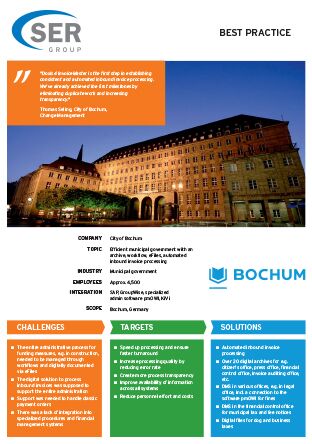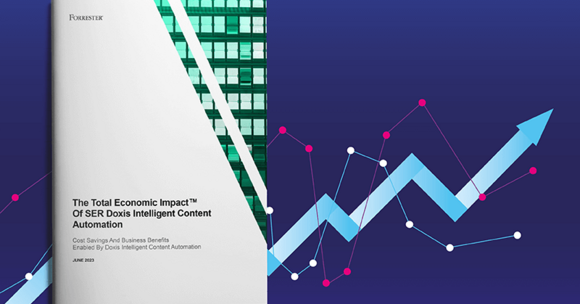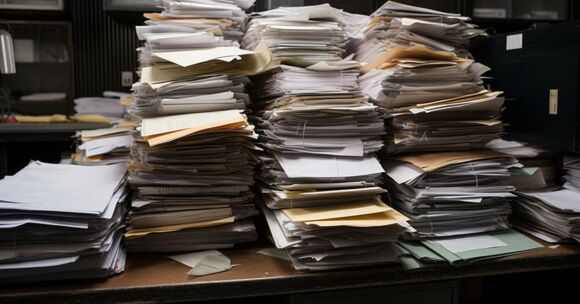SER Blog Customer Stories & Use Cases
Modern digital archive and eGovernment services for the City of Dresden
| Julia Pedak
42 kilometers of files with 4,200 deeds, 123,000 maps and blueprints, 517,000 photos and 45,000 library holdings from the past 800 years: until recently, this treasure trove of civic memory was stored in paper format in the City of Dresden’s archive, the second largest municipal archive in Germany. Yet not only relics of yesteryear were stored there; the city government also stored its records as printouts in paper folders. Today, the City of Dresden is a modern example of eGovernment with digital citizen services and an archive that meets legal requirements.

Submitting paperless requests and getting notifications electronically: these activities have become second nature for the people of Dresden. For more than 20 years, the city government has been fully equipped with hardware and software. Employees stopped using paper for correspondence long ago, and today they rely on digital workflows. By 2025, all offices will work with electronic files and notices. What stood in the way of becoming a true eGovernment in the past: the city’s paper archive. How should digital documents in their original form be stored? Printouts are considered a copy. You can barely read ten-year-old CDs or floppy disks today. For this reason, the City of Dresden implemented a digital solution for archiving with the SER Group and its Doxis solution – and it has proven to be a winning decision in times of social distancing.
City of Dresden eGovernment
The last hurdle to eGovernment was cleared with the digitalization of the City of Dresden’s municipal archive. This also made Dresden the first municipality in the state of Saxony to comply with the German legal requirement to digitize. Working with SER, the city’s IT services and archive teams got the project rolling. "About half of the municipal offices now produce electronic documents," says city archive director Thomas Kübler. This includes software-generated decisions about resident requests, maps, photos, audio recordings of meetings, or even SMS messages used by an official to provide important instructions. All this is archived now by the city with the Doxis-based archive solution DiPs.kommunal. Consequently, Dresden not only fulfills its legal requirements but also provides its residents with state-of-the-art service: decisions are made digitally much faster, paper stacks disappear and, last but not least, working and archiving digitally helps the environment – and city coffers.
At the opening ceremony in May 2019, Mayor Hilbert underscored why digitalization is a high priority for Dresden: "Without the end-to-end digitalization of our processes, we could not provide residents the versatile offerings they expect. And for our employees, digitalization is a step into new, modern working worlds. eGovernment opens up completely new possibilities for us."

Efficient eGovernment with ECM
Read all about how the City of Bochum is digitalizing and expediting eGovernment processes with Doxis and preventing duplicate work for its employees.
Read nowAccess to archives – from home
Electronic files, audio recordings, blueprints and other digital documentation from current times have to be retained electronically by the city and made available publicly. For this purpose, Dresden is providing its residents with free access to the online city archive. Users can conduct full-text searches for documents conveniently from home – this service was extremely popular even before the lockdown. The wide range of search options is one reason why the state capital relies on the solution from the SER Group. However, the issue of security also plays a major role: data privacy, copyright, retention periods, as well as archival-legal guidelines must not be violated. Only after all of these points have been reviewed does the city provide documents online for the public. From document creation to archiving, every step is logged completely, and a data copy is stored as backup in another confidential archive. Dresden is calculating in 1.5 terabytes of data space per year for the growing volume of data – and the Doxis-based archive will grow seamlessly with these needs.
Long-term archive based on international standards
The public can use the digital archive to access a multitude of records from contemporary history, e.g. original recordings of town hall meetings, press conferences and city council meetings. Users can listen in on the historic moments – and continue to do so over the next 100 years. After all, retroactively digitized archive materials such as floppy disks, videos or audio tapes are now backed up in long-term WAVE, RF64 and MPEG-4 formats. For files, PDF/A is used. The archiving solution complies thereby with domestic and international standards for an Open Archival Information System (OAIS), with which the SER solution also complies.
Cross-municipal digital memory
Alongside Dresden, other German metropolises such as Cologne, Mannheim and Munich have also set up similar archives. SER Group is already a project partner of the city of Cologne, which together with the LWL in Munster, provides long-term archiving for all municipalities in the state of NRW. This type of comprehensive solution is now also planned for Saxony: "We have developed this system so that it can also be used by other municipalities in Saxony," states Dresden’s Digital Mayor Peter Lames.
The latest digitization trends, laws and guidelines, and helpful tips straight to your inbox: Subscribe to our newsletter.
How can we help you?
+49 (0) 30 498582-0Your message has reached us!
We appreciate your interest and will get back to you shortly.




